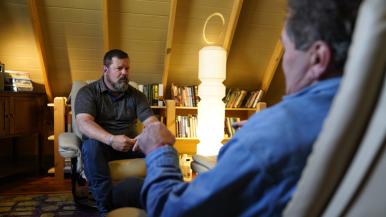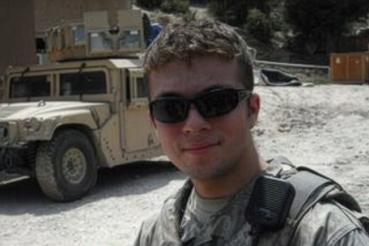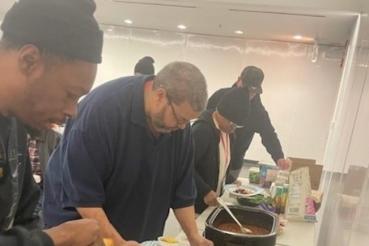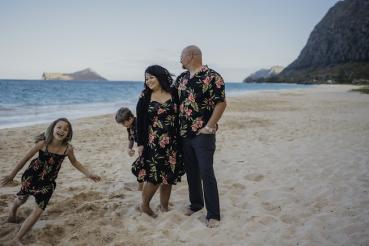Reg McCutcheon did not need anyone to tell him he had a problem. As a trained trauma therapist, he recognized the signs all too well. Quick to anger, Reg was struggling to adapt to a new blended family and common civilian woes such as getting cut off while driving.
What he needed was someone who could help. But that proved harder to identify.
A retired lieutenant colonel who served with the Air Force for 34 years, Reg had trouble finding a therapist with military, veteran and trauma experience. Sessions with the therapist he did get in Indianapolis — two hours away from Reg’s home in Southern Indiana — were relegated to phone calls. Options were limited.
“You’re not going to get a treatment plan without having some addiction problems, and I didn’t have any addiction problems, just an anger problem,” Reg said.
Then, he had an epiphany. More than once, Reg had called RUSH to refer clients to the Road Home Program. So, he picked up the phone again.
“That’s when I called for me instead of someone else,” Reg said. “I think the first step’s knowing you need help and acknowledging the struggle.”
Hard to shake
Reg’s time with the military was much different than he expected. After he spent nearly two decades in the Air Force, the 9/11 attacks changed his trajectory. The military needed people, so he stuck around. In 2011, he went to Afghanistan with the expectation that he would be doing intel work.
Instead, he found himself doing breaching system and logistics work for NATO, running special projects for a two-star general. That meant dealing with the experiences of combat — something “pretty unavoidable in the long run, especially if you’re out in the field every day,” Reg said.
He lost a friend on the fourth day there and more as the conflict continued.
“There’s consequence,” Reg said. “In Afghanistan, you’re always on edge.”
That feeling is hard to shake after coming home. When Reg was in armored vehicles in Afghanistan, the modus operandi was to never stop between Points A and B. Driving as a civilian back home was a different beast.
“I found myself having a lot of road rage,” Reg said. “People would run over you to get into McDonald’s.”
'I just got to the point where I was angry all the time’
As a Certified Clinical Trauma Professional, Reg also found himself absorbing the issues of the clients he counseled in ways he knew he shouldn’t.

“I probably owned a little bit more of that than I should have,” Reg said. “I’m the solution guy. I’m the Shell Answer Man for a lot of people. And I didn’t have the answers for me.”
Reg’s challenges also started to take a toll on his home life. He had always been a planner with well-defined expectations. His children knew that well. But Reg had a tough time navigating a new dynamic when his wife, Shana, introduced her six children into their large, blended family. He would get angry about things like a phone charger disappearing.
“I found myself being very intolerant sometimes to what most people could just pass aside,” Reg said. “I just got to the point where I was angry all the time.”
Reg and Shana married roughly three years ago, after Reg retired from service. Shana did not have a military background. She was new to that world where, as an officer, Reg was used to being in charge — the “when he says jump, we say how high” mentality, Shana recalled.
“In his world, that’s normal,” Shana said. “But that was not normal for us.”
He spent several months often angry, Shana said. A few immediate family deaths in the span of two months only added triggers. Though, at the time Shana did not completely recognize the signs of his struggle.
“I believe he was in a little bit of a controlled atmosphere before, so he couldn’t really speak to what he was really feeling,” Shana said. “I was working hard to allow him to do that. He’s never had that before.”
Following the Road Home
Through the Road Home’s Intensive Outpatient Program, or IOP, Reg came to Chicago and worked with psychologist Jon Murphy, PhD, twice a day for two weeks in August 2022. Reg, 60, committed to the process as client, rather than as therapist, and promised to work his tail off.
“Jon is amazing,” Reg said. “He knew how to handle me. We had some pretty freeing conversations about anger and how it was manifesting itself.”
Reg also got on the phone each day with Shana to go over his notes. That included things related to their relationship, sticking points and triggers for him.
“It’s my work, but I brought her in alongside, and she challenged me in a healthy way,” Reg said. “We had to be a team in the process.”
Road Home welcomes the partners of clients to join video chats for portions of the IOP. That dynamic is critical, Reg said. Families need to understand the challenges of post-traumatic stress disorder to be part of the healing journey.
“Most people don’t understand,” Reg said. “Families are desperate for something, but they, too, are suffering their own trauma. The person that came home from combat is not the same person who left for combat. It’s a bell you can’t unring.”
Shana was thankful Reg included her in the process.
“It’s not just his problem,” Shana said. “Yes, he needs to deal with it, but it’s going to affect the whole entire family. We walked away from our experience at Road Home with lots of desire to find ways to incorporate the family.”
Lessons learned
When Reg enlisted in the Air Force in 1980, he filled out what the branch called a “dream sheet.” He wanted to be a counselor/therapist. After going to Afghanistan, he saw his dream as more of a necessity.
“From that point on, I knew that I had to fulfill that,” Reg said. “I saw what was going on and just felt like I needed to be part of the solution.”
Reg earned a bachelor’s and multiple master’s degrees en route to running a nonprofit counseling practice that treats others with trauma, grief and other mental health conditions. His experience at the Road Home Program helped him hone his interaction process with his own clients. They still have his number for anything pressing. But instead of trying to take on every problem in 20 minutes flat, as he used to do, Reg tries to schedule things in a way that gives everyone a chance to think.
Reg’s personal experience with the IOP also reinforced just how important the Road Home Program is to veterans — especially because the program takes any vet, regardless of discharge status.
“So many programs, you have to have an honorable discharge or a general discharge,” Reg said. “There’s lot of vets out there who have been dishonorably discharged, who didn’t deserve it, because they had PTSD.”
Reg has worked with plenty of veterans who were charged with a DUI or got into a fight and then were kicked out of the military.
“Had they treated their trauma, they would have got back in good graces or a good cycle,” he said.
Instead, they ended up feeling desperate, let down, betrayed.
“Road Home never lets you feel that,” Reg said.
Far from finished
Reg did not leave the Road Home Program perfect. Together, he and Shana continue the work to create something stable for their family.
“We’re not after perfect,” Shana said. “We’re after better and healthy.”
Now they have the tools they need to address issues as they arise — to recognize the signs, de-escalate and communicate.
“I’m very open and vulnerable with it,” Reg said. “It doesn’t mean I go in a corner and cry; I just have better coping skills. There still are, and there will always be, things that we get stuck on. That doesn’t mean it’s terminal. It just means we then have to buckle down and figure it out.”
He also learned some important lessons about how to enjoy life at the retreat he and his family have built together.
“I’ve been a pretty hard-charger all my life,” Reg said. “I don’t have to be a hard-charger day-to-day. I don’t have to solve everything.”
To learn more about supporting the Road Home Program’s work to provide mental health care at no cost to veterans, active-duty service members and families, please contact Michelle Boardman, senior director of development, at michelle_a_boardman@rush.edu or (312) 942-6884. You may also make a gift online to fuel services and innovation at the Road Home Program.




